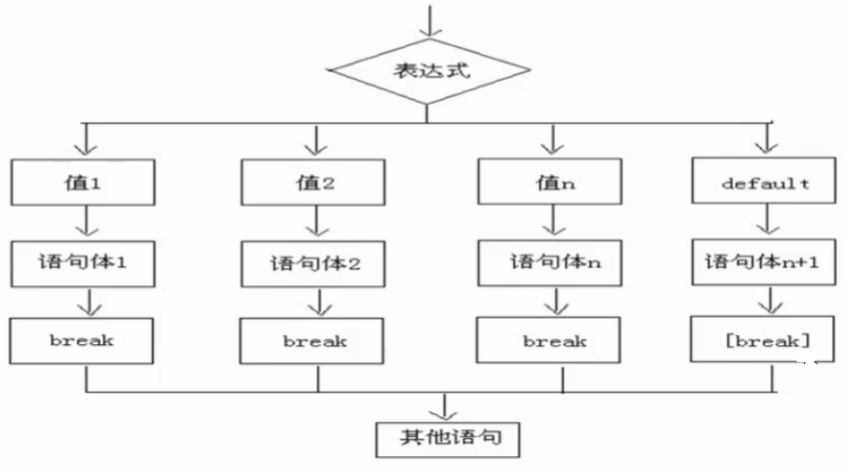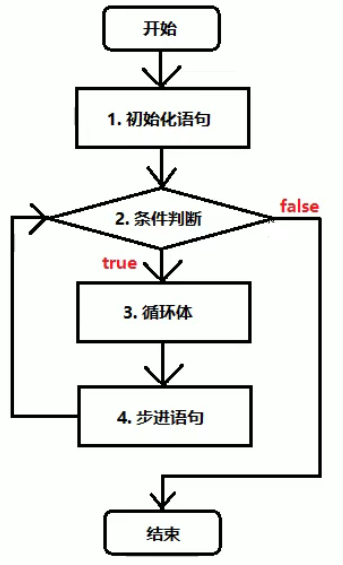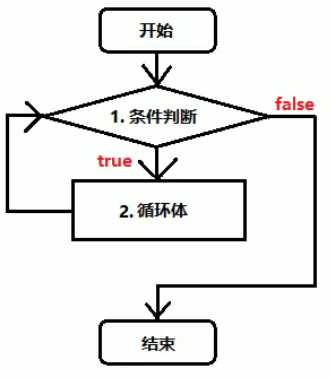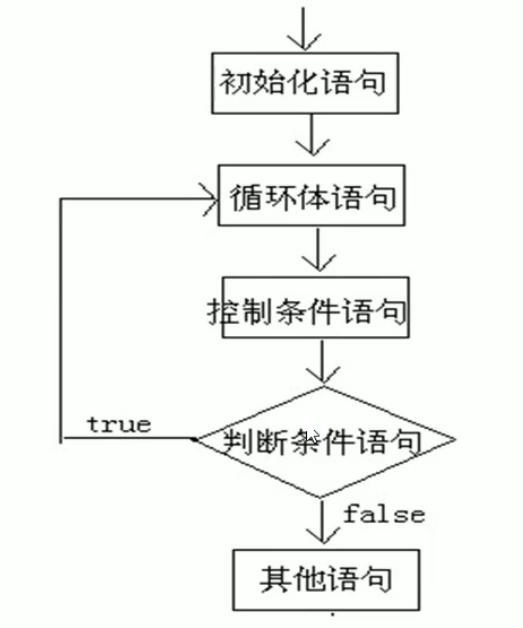Java_ Select and loop statements
1. Select statement – switch
(1) Statement format:
switch (expression) {
case Constant value 1:
Statement body 1;
break;
case Constant value 2:
Statement body 2;
break;
....
default:
Statement body n+1;
break;
}
(2) Flow chart:

(3) Code implementation:
public class test{
public static void main(String[] args){
int num=10; //Data exception!!!
switch(num){
case 1:
System.out.println("Monday");
break;
case 2:
System.out.println("Tuesday");
break;
case 3:
System.out.println("Wednesday");
break;
case 4:
System.out.println("Thursday");
break;
case 5:
System.out.println("Friday");
break;
case 6:
System.out.println("Saturday");
break;
case 7:
System.out.println("Sunday");
break;
default:
System.out.println("Data exception!!!");
break;
}
}
}
(4) Precautions:
- The value after multiple case s cannot be repeated
- There can only be (byte,short,char,int,String,enum) these data types in the parentheses after switch
- The format of switch statement can be flexible: the sequence can be reversed, and the break statement can be omitted (if the break is omitted, continue to execute downward until a break or the end of the whole is encountered)
public class test{
public static void main(String[] args){
int num=3; //Wednesday, Thursday, Friday, Saturday
switch(num){
case 1:
System.out.println("Monday");
break;
case 2:
System.out.println("Tuesday");
break;
case 3:
System.out.println("Wednesday");
// break;
case 4:
System.out.println("Thursday");
// break;
case 5:
System.out.println("Friday");
// break;
case 6:
System.out.println("Saturday");
break;
case 7:
System.out.println("Sunday");
break;
default:
System.out.println("Data exception!!!");
break;
}
}
}
2. Circular statement
(1) Components of the cycle structure:
- Initialization statement
- Conditional judgment
- Circulatory body
- Step statement
2.1 loop statement – for
(1) Statement format:
for(Initialization expression;Boolean expression;Step expression){
Circulatory body;
}
(2) Flow chart:

(3) Code implementation:
//Print (Hello) 100 times
public class test{
public static void main(String[] args){
for(int i=0;i<100;i++){
System.out.println("Hello "+i);
}
System.out.println("Program stop");
}
}
2.2 circular statement – the standard format of while
(1) Statement format:
while(Conditional judgment){
Circulatory body
}
(2) Flow chart:

2.3 loop statement - extended format of while
(1) Statement format:
Initialization statement;
while(Conditional judgment){
Circulatory body;
Step statement;
}
(2) Flow chart:

(3) Code implementation:
//Print (Hello) 100 times
public class test{
public static void main(String[] args){
int i=0;
while(i<10){
System.out.println("Hello "+i);
i++;
}
}
}
2.4 circular statement – standard format of do... while
(1) Statement format:
do{
Circulatory body
}while(Conditional judgment);
2.5 loop statement – extended format of do... while
(1) Statement format:
Initialization statement:
do{
Circulatory body
Step statement
}while(Boolean expression);
(2) Flow chart:

(3) Code implementation:
public class test{
public static void main(String[] args){
int i=0;
do{
System.out.println("Hello "+i);
i++;
}while(i<10);
}
}
(4) Print even and between 1-100
//Find the even sum between 1 and 100
//(1) for loop
public class test{
public static void main(String[] args){
int sum=0; //accumulator
for(int i=1;i<=100;i++){
if(i%2==0){ //even numbers
sum+=i;
}
}
System.out.println("The result is: "+sum);
}
}
// (2) while loop
public class test{
public static void main(String[] args){
int sum=0; //accumulator
int i=1;
while(i<100){
if(i%2==0){
sum+=i;
}
i++;
}
System.out.println("The result is: "+sum);
}
}
//do..while Loop
public class test{
public static void main(String[] args){
int sum=0; //accumulator
int i=1;
do{
if(i%2==0){
sum+=i;
}
i++;
}while(i<100);
System.out.println("The result is: "+sum);
}
}
2.6 differences between the three cycles
(1) If the condition judgment is not satisfied, the for loop and the while loop will execute 0 times, but the do... While loop will execute at least once.
(2) The variables of the for loop are defined in parentheses and can only be used inside the loop; The while and do while loop initialization statements are already outside, so they can continue to be used when the loop is out.
3. Cycle control_ break
(1) Usage of break keyword:
- Used in a switch statement. Once executed, the entire switch statement ends immediately
- Used in loop statements. Once executed, the whole loop statement ends immediately and interrupts the loop
//Execute the printout statement only three times
public class test{
public static void main(String[] args){
for(int i=1;i<10;i++){
if(i==4){
break;
}
System.out.println("hello "+i);
}
}
}
// hello 1
// hello 2
// hello 3
(2) Usage of continue keyword:
- Once executed, immediately skip the remaining contents of the current cycle and start the next cycle immediately
//The fourth printout statement is not executed, and other normal printouts are not executed
public class test{
public static void main(String[] args){
for(int i=1;i<=6;i++){
if(i==4){
continue;
}
System.out.println("hello "+i);
}
}
}
// hello 1
// hello 2
// hello 3
// hello 5
// hello 6
4. Dead cycle: never stop
(1) Statement format:
while(true){
Circulatory body
}
(2) Code implementation:
public class test{
public static void main(String[] args){
while(true){
System.out.println("hello");
}
}
}
5. Loop nesting
public class test{
public static void main(String[] args){
for(int hour=0;hour<24;hour++){
for(int minute=0;minute<60;minute++){
System.out.println(hour+"spot"+minute+"branch");
}
}
}
}